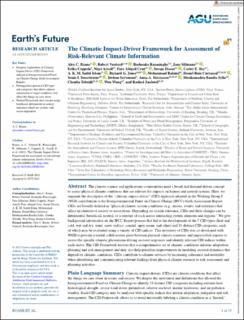The Climatic Impact-Driver Framework for Assessment of Risk-Relevant Climate Information
| dc.contributor.author | Ruane, Alex C. | |
| dc.contributor.author | Vautard, Robert | |
| dc.contributor.author | Ranasinghe, Roshanka | |
| dc.contributor.author | Sillmann, Jana | |
| dc.contributor.author | Coppola, Erika | |
| dc.contributor.author | Arnell, Nigel | |
| dc.contributor.author | Cruz, Faye Abigail | |
| dc.contributor.author | Dessai, Suraje | |
| dc.contributor.author | Iles, Carley Elizabeth | |
| dc.contributor.author | Islam, A. K. M. Saiful | |
| dc.contributor.author | Jones, Richard G. | |
| dc.contributor.author | Rahimi, Mohammad | |
| dc.contributor.author | Carrascal, Daniel Ruiz | |
| dc.contributor.author | Seneviratne, Sonia I. | |
| dc.contributor.author | Servonnat, Jérôme | |
| dc.contributor.author | Sörensson, Anna A. | |
| dc.contributor.author | Sylla, Mouhamadou Bamba | |
| dc.contributor.author | Tebaldi, Claudia | |
| dc.contributor.author | Wang, Wen | |
| dc.contributor.author | Zaaboul, Rashyd | |
| dc.date.accessioned | 2023-05-09T13:05:58Z | |
| dc.date.available | 2023-05-09T13:05:58Z | |
| dc.date.created | 2022-12-19T08:59:29Z | |
| dc.date.issued | 2022 | |
| dc.identifier.citation | Earth's Future. 2022, 10 (11), . | en_US |
| dc.identifier.issn | 2328-4277 | |
| dc.identifier.uri | https://hdl.handle.net/11250/3067318 | |
| dc.description.abstract | The climate science and applications communities need a broad and demand-driven concept to assess physical climate conditions that are relevant for impacts on human and natural systems. Here, we augment the description of the “climatic impact-driver” (CID) approach adopted in the Working Group I (WGI) contribution to the Intergovernmental Panel on Climate Change (IPCC) Sixth Assessment Report. CIDs are broadly defined as “physical climate system conditions (e.g., means, events, and extremes) that affect an element of society or ecosystems. Depending on system tolerance, CIDs and their changes can be detrimental, beneficial, neutral, or a mixture of each across interacting system elements and regions.” We give background information on the IPCC Report process that led to the development of the 7 CID types (heat and cold, wet and dry, wind, snow and ice, coastal, open ocean, and other) and 33 distinct CID categories, each of which may be evaluated using a variety of CID indices. This inventory of CIDs was co-developed with WGII to provide a useful collaboration point between physical climate scientists and impacts/risk experts to assess the specific climatic phenomena driving sectoral responses and identify relevant CID indices within each sector. The CID Framework ensures that a comprehensive set of climatic conditions informs adaptation planning and risk management and may also help prioritize improvements in modeling sectoral dynamics that depend on climatic conditions. CIDs contribute to climate services by increasing coherence and neutrality when identifying and communicating relevant findings from physical climate research to risk assessment and planning activities. | en_US |
| dc.language.iso | eng | en_US |
| dc.publisher | AGU | en_US |
| dc.rights | Navngivelse 4.0 Internasjonal | * |
| dc.rights.uri | http://creativecommons.org/licenses/by/4.0/deed.no | * |
| dc.title | The Climatic Impact-Driver Framework for Assessment of Risk-Relevant Climate Information | en_US |
| dc.title.alternative | The Climatic Impact-Driver Framework for Assessment of Risk-Relevant Climate Information | en_US |
| dc.type | Peer reviewed | en_US |
| dc.type | Journal article | en_US |
| dc.description.version | publishedVersion | en_US |
| dc.source.pagenumber | 0 | en_US |
| dc.source.volume | 10 | en_US |
| dc.source.journal | Earth's Future | en_US |
| dc.source.issue | 11 | en_US |
| dc.identifier.doi | 10.1029/2022EF002803 | |
| dc.identifier.cristin | 2094928 | |
| cristin.ispublished | true | |
| cristin.fulltext | original | |
| cristin.qualitycode | 1 |
Tilhørende fil(er)
Denne innførselen finnes i følgende samling(er)
-
Journal articles [478]

